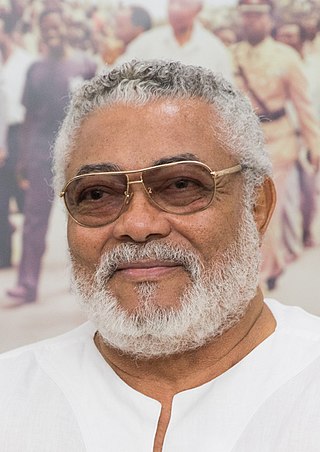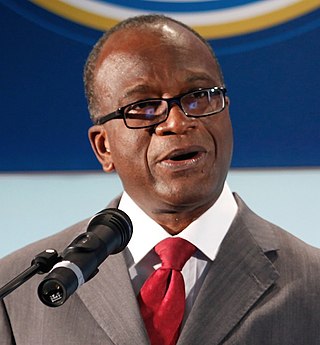
The New Patriotic Party (NPP) is a centre-right and liberal-conservative political party in Ghana. Since the democratisation of Ghana in 1992, it has been one of the two dominant parties in Ghanaian politics, with its leading rival being the centre-left National Democratic Congress (NDC). John Kufuor of the NPP was President of Ghana from 2001 to 2009. At the elections held on 7 December 2004, the party won 129 out of 230 seats. The NPP candidate was Kufuor, who was re-elected as president with 52.75% of the vote. The New Patriotic Party symbol is the African elephant and the New Patriotic Party colours are red, white, and blue.

Jerry John Rawlings was a Ghanaian military officer, aviator and politician who led the country for a brief period in 1979, and then from 1981 to 2001. He led a military junta until 1992, and then served two terms as the democratically elected president of Ghana.

The Parliament of Ghana is the legislative body of the Government of Ghana.

The Provisional National Defence Council (PNDC) was the name of the Ghanaian government after the People's National Party's elected government was overthrown by Jerry Rawlings, the former head of the Armed Forces Revolutionary Council, in a coup d'état on 31 December 1981. He remained in power until 7 January 1993. In a statement, Rawlings said that a "holy war" was necessary due to the PNP's failure to provide effective leadership and the collapse of the national economy and state services.

The Supreme Military Council (SMC) was the ruling government of Ghana from 9 October 1975 to 4 June 1979. Its chairman was Colonel I.K. Acheampong. He was also the Head of state of Ghana due to his chairmanship.
Joseph Henry Mensah was a Ghanaian politician and economist.

General elections were held in Ghana on 7 December 2008. Since no candidate received more than 50% of the votes, a run-off election was held on 28 December 2008 between the two candidates who received the most votes, Nana Akufo-Addo of the governing New Patriotic Party and John Atta Mills of the opposition National Democratic Congress. Mills was certified as the victor by a margin of less than one percent, winning the presidency on his third attempt. It is to date the closest election in Ghanaian history.
Kojo Acquah Yankah is a former Member of Parliament in Ghana. He also served as a Minister of State in the Rawlings government. He is the founder and President of the African University College of Communications and is also a former editor of the Daily Graphic, the widest circulation newspaper in Ghana.

Mike Allen Hammah is a politician and a former Minister for Lands and Natural Resources of Ghana. He had been the Minister for Transport until January 4, 2011, when he was moved after a cabinet reshuffle by President Mills. He was also the Member of Parliament for the Effutu Constituency in the Central Region of Ghana.
Samuel Ofosu-Ampofo is a Ghanaian politician and a former Member of Parliament and former District Chief Executive for the Fanteakwa North district of the Eastern Region of Ghana. He is also a former Eastern Regional Minister and a former National Organizer of the National Democratic Congress. Ampofo is also a former Minister for Local Government and Rural Development. He is the former national Chairman for the National Democratic Congress(NDC).

The Minister for Finance and Economic Planning is the Ghanaian government official responsible for the Ministry of Finance of Ghana. The Minister for Finance since January 2017 has been Ken Ofori-Atta, co-founder and former Chairman of the Databank Group in Ghana. He was appointed by President Akufo-Addo following the Ghanaian general election in December 2016. Kwesi Botchwey stayed in office the longest, first under Jerry Rawlings as Secretary for Finance in the PNDC military government and then as Minister for Finance in the constitutionally elected Rawlings government at the beginning of the Fourth Republic and was in charge of the Economic Recovery Programme under the auspices of the World Bank which oversaw major economic reform in Ghana.

General elections were held in Ghana on 7 December 2016 to elect a President and Members of Parliament. They had originally been scheduled for 7 November 2016, but the date was later rejected by Parliament. Former foreign minister Nana Akufo-Addo of the opposition New Patriotic Party was elected President on his third attempt, defeating incumbent President John Mahama of the National Democratic Congress.

Johnson Asiedu Nketiah is a Ghanaian politician and Chairman of the National Democratic Congress (NDC). He is noted to be the longest serving General Secretary of the NDC.
Derrick Oduro is a Ghanaian politician who is also a retired military personnel with the Ghana Army and has a rank of major. He is a member of the New Patriotic Party and the deputy Minister for Defence in Ghana. He is also a member of parliament for Nkoranza North Constituency in the then Brong Ahafo region now Bono East Region.
Benjamin Emmanuel Ephson is a Ghanaian journalist and pollster. Ephson is the Managing Editor of the Daily Dispatch newspaper.
Sampson Kwaku Boafo is a Ghanaian politician and a member of the New Patriotic Party. He was the Member of Parliament in the Asante region for the Subin constituency in the fourth parliament of the fourth Republic of Ghana.
Kojo Tsikata was a Ghanaian military officer and politician, who served as the Head of National Security and Foreign Affairs of the Provisional National Defence Council (PNDC). He was listed as a retired army captain in the Ghana Army.
Yaw Manu-Yeboah is a Ghanaian politician and educationist. He was a member of the First Parliament of the Fourth Republic of Ghana from 1993 to 1997. He was a member of parliament for Sunyani East Constituency in the Brong-Ahafo region of Ghana, under the membership of the National Democratic Congress.








